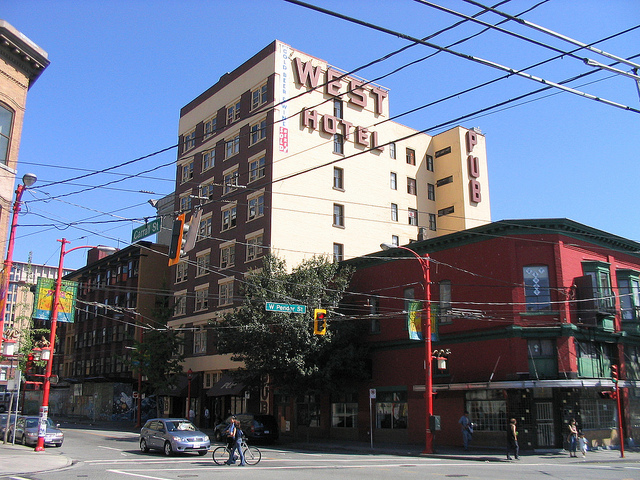rabble is expanding our Parliamentary Bureau and we need your help! Support us on Patreon today!
Residents of Vancouver’s Downtown Eastside (DTES) are receiving free Wi-Fi access thanks to an initiative by the DTES Street Market.
Operating as a low-barrier social enterprise where individuals with limited income can sell recycled goods, the DTES Street Market has created a free, public Wi-Fi network out of their office space. The goal is to provide a much-needed service for those who would otherwise struggle to pay their own Wi-Fi or cellphone bills.
Market coordinator Roland Clarke says there’s a real need for accessible Wi-Fi in marginalized neighbourhoods, particularly since shelters and social housing rarely provide Internet access.
“A lot of people don’t know this but when you apply for welfare, you actually cannot do it in person anymore,” he says. “A lot of government services are switching to online access only and this accentuates the digital divide.”
According to Clarke, this digital divide is a significant problem that cities need to address when considering their low-income communities. Internet access is crucial for using services, paying bills, applying for jobs and communicating with loved ones.
“It’s often common to hear how attached to our smartphones we are and how attached to the Internet or Facebook we are as a society,” says Clarke. “But the flip side of this then, is because we are getting all of our information this way, if you don’t have access to the Internet then that makes you extremely helpless.”
The DTES Street Market has invested in low-cost signal repeaters through Open Mesh that have allowed them to expand the reach of their office’s Wi-Fi signal. They use revenue from the weekly market’s coffee sales and tent rentals to fund the project and have purchased 23 signal repeaters to date. Local businesses and residents have allowed Clarke and his team to put these repeaters in their windows, enabling the organic growth of an accessible neighbourhood Wi-Fi network.
Up to 4,400 unique users in the DTES make use of this free Wi-Fi each month, a significant number for a community that only hosts 18,000 residents.
Although the DTES Street Market has full support from the City of Vancouver to install these Wi-Fi networks and repeaters, Clarke explained, he ultimately hopes that the digital divide between individuals of varying socioeconomic statuses will be considered when the city develops its digital strategy.
“There are services designed to help people with limited funds,” says Clarke. “But there’s another barrier in place because these people tend not to have easy access to online systems… if you don’t have Internet access, you’re crippled.”
Alyse is a Vancouver-based writer and editor with a passion for social justice, storytelling and tea. She studied English Literature and Global Development at Queen’s University and believes in the ability to make positive changes through media that digs deep, asks questions and shares narratives. Alyse was the Editor of Servants Quarters and has written for the Queen’s News Centre, Quietly Media and the Vancouver Observer.
rabble is expanding our Parliamentary Bureau and we need your help! Support us on Patreon today!



